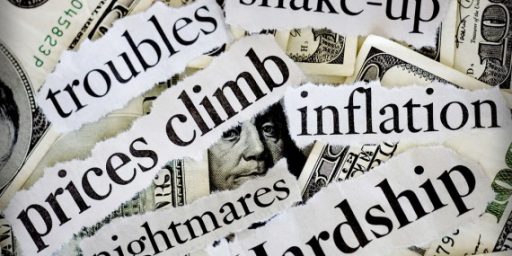Rationale of the Bailout
While I am not a fan of the bailout, buying the toxic assets from foundering financial institutions, there is a logic to it that, in the end, could work. Here is the idea,
Right now people are very uncertain and very nervous. As such they are most likely to to err on the side of caution. So when a financial insitution is in trouble and wants to sell some risky assets to shore up their balance sheet they find that the prices people are willing to pay are quite low. This could make a bad situation worse so they don’t sell and thus risk failure and have difficult providing new credit to potential borrowers.
So enter the government which has the entire taxpayer base for its deep pockets and will likely be around for a very long time. Not all the mortgages in these mortgage backed securities are stinkers. Most people are paying their mortgages on time and not struggling to do so. In fact, all the histrionics about how the economy is gawdawful are just that histrionics. Last quarter growth was revised down from 3.3% to 2.8%, not great news, but 2.8% annualized growth for the last quarter is pretty decent. Yes unemployment has inched up a bit, but by historical standards it is still quite low. And even oil prices are lower than they were a few weeks ago. None of this is good enough to qualify the economy as being in a recession let alone a depression. So the government takes over these assets and holds on to them. Some of them will turn out to be stinkers and there the government will lose money. But if a large enough percentage of these assets are good and people are currently being overly pessimistic then the government could make money. Most people satisfy their mortgage obligations. Most homes get paid off. However, it is still a risk. Notice that all of the preceeding depends on words like ‘most’ and ‘if’. It could be that the government is really going to buy just the stinkers are the taxpayer is left holding the bag.
The downsides are that it is a risk. Also it rewards people for being foolish at least in that it prevents them from bearing the full costs and responsibility for being foolish. It is very much like a subsidy on being foolish. Another thing is that it gets the government into the financial sector like never before, and before anyone says, “Well they can’t be any worse than the guys on Wall Street”, keep in mind these are the people who buy $600 hammers and have lost billions at the Defense Department and were supposed to keep watch over Fannie Mae and Freddie Mac.





My concern is that once the government owns those mortgages, debt-forgiveness will be the new campaign issue, and we will give away any money we might have made back from them in the name of buying votes. It’s got all the socialist benefit of welfare, and all the capitalist benefit of not giving the government your money.
There’s that too. Under the current plan, who decides what the government can buy, the Treasury or the company selling to them?
What are the odds of the riskier loans being renogotiated to terms more likely to keep the borrowers paying? If you are buying these at a discount it gives you the wiggle room to better the terms and still make a profit.
It seems more of this should be going on before letting the loans sour completely. Having new owners of the paper makes this easier to justify as well.